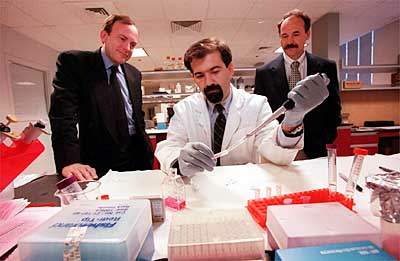
Michael West, left, Jose Cibelli, center, and Jim Robl at Advanced Cell Technology in Worcester, Mass. The small biotechnology company says it has found a method that may be used to grow human replacement tissue.
NEW YORK (AP) -- Scientists at a Massachusetts company say they have made a human cell revert to the primordial state from which all other cells develop by fusing it with a cow egg, The New York Times reported today.
Although the research announced by Advanced Cell Technology has yet to be published or confirmed, the company said the method eventually could be used to grow replacement body tissues.
 Michael West, left, Jose Cibelli, center, and Jim Robl at Advanced Cell Technology in Worcester, Mass. The small biotechnology company says it has found a method that may be used to grow human replacement tissue. |
Dr. Michael West, Advanced Cell Technology's chief executive, said he announced the feat to gauge its acceptability, so the privately held company can decide whether to commit money to developing the process.
The hybrid cell is made by removing the nucleus of a cow egg and inserting a human cell's nucleus. The research, which was conducted three years ago using cells donated by one of the scientists involved in the research, showed that the cow proteins were displaced by human proteins, the company said.
The hybrid cell theoretically could be transferred to a uterus and grown into a clone of the human donor, but the company said that would be unsafe and unethical. Instead, the cell could be guided into becoming human tissue.
Despite the announcement, several experts in the field told the Times they needed much more proof before they believed embryonic cells had been created. Some also doubted that the technique would work.
"It's hard to say this is a total sham, but I smell a sham here," said Dr. Roger Pedersen of the University of California, San Francisco. He doubted that the cow-derived mitochondria, which produce energy in cells, would work well enough in human cells.
Last week, two published studies described how human stem cells, the foundation of cells that form all body parts, can be grown in a laboratory.
Dr. John Gearhart of Johns Hopkins University, who was involved in one of those studies, said of Advanced Cell Technology's claim: "It's not that I don't believe this biologically. I just think they could have given a little bit more assurance as to what was done here."